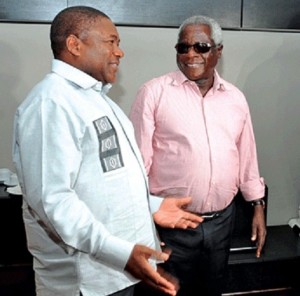 In an interview published in Friday’s issue of the independent weekly “Savanaâ€, Dhlakama said he was dispensing with any direct dialogue between himself and Nyusi. “I’m saying that I organized a team, and President Nyusi also has a team, and they are negotiating in Maputo, in the presence of international mediatorsâ€, he declared.
In an interview published in Friday’s issue of the independent weekly “Savanaâ€, Dhlakama said he was dispensing with any direct dialogue between himself and Nyusi. “I’m saying that I organized a team, and President Nyusi also has a team, and they are negotiating in Maputo, in the presence of international mediatorsâ€, he declared.
Dhlakama was referring to the Joint Commission set up between the government and Renamo which has so far held 20 meetings in Maputo, without reaching definitive conclusions on any of the points on its agenda. When the Commission was set up, it was specifically stated that its purpose was to prepare the ground for a face-to-face meeting between Nyusi and Dhlakama.
The two men have only met on two previous occasions, both in February 2015. The main result of these meetings was that Renamo called off its boycott of the country’s parliament, the Assembly of the Republic. But since then Dhlakama has refused any further meeting with Nyusi, and has not set foot in Maputo.
“I don’t think it’s important that Nyusi and Dhlakama, two people, have to meet to negotiate on their own, because this country does not belong to Nyusi or to Dhlakamaâ€, the Renamo leader said. “We have representatives in the commissions. They are accredited so that they can negotiate. I speak with my representatives every day, and I like to believe that Nyusi, who is in Maputo almost every day, does the sameâ€.
So he dispensed with any meeting between the two men, unless it was to sign final documents emerging from the Joint Commission.
“While dialogue is taking place, and the delegations are negotiating in the capital, a meeting between Nyusi and Dhlakama is not necessaryâ€, he said.
As far as Dhlakama was concerned, a final document should be produced handing over six central and northern provinces (Sofala, Manica, Tete, Zambezia, Nampula and Niassa) to Renamo control. He claims that Renamo won these provinces in the October 2014 elections, although the results show a rather different picture, in which Dhlakama topped the presidential poll in five provinces, but Renamo only won the parliamentary election in two.
Dhlakama insisted that Renamo would govern those provinces “with our own policiesâ€, although the Renamo governors “will have to recognise the President of the Republicâ€.
Those governors, Dhlakama said, “will have their own powers, because we are not going to be integrated into a Frelimo regime, nor will there be any Government of National Unityâ€. The Renamo governors “will govern with the Renamo programmeâ€, although they would be sworn into office by Nyusi.
However, under the present Constitution, it is not possible for provinces to implement a programme different from that decided upon centrally. At the moment the entire country is following the Five Year Programme for 2015-2019 that was approved by parliament in mid 2015. The only way to change this would be by a constitutional amendment, which certainly cannot be passed within the time frame proposed by Dhlakama.
Dhlakama wanted Renamo governors appointed this year. They would then operate from 2017 to 2019. With the general elections of 2019 “this provisional governance will end, and from then on the governors will be electedâ€.
Dhlakama admitted that “people are tired of warâ€, but he rejected any ceasefire “before we have reached a general agreement†– in other words, without Renamo governing the six provinces that Dhlakama wants, there will be no cessation of hostilities.
“We cannot end the conflict and the military hostilities and restore peace, while we do not resolve the problem of governanceâ€, he said. However, he was optimistic that by the end of the year a deal would be reached under which Renamo provincial governors would be appointed.
The government side, however, has made it very clear that all the points on the agenda of the Joint Commission must be decided. In other words, there can be no agreement on Renamo provincial governors without not only a cessation of hostilities, but also a firm mechanism on the disbanding and disarming of the Renamo militia. It is difficult to see how this can be achieved in a couple of months, particularly as the complete package may require constitutional amendments and new or amended legislation that must be debated and passed in parliament.
Dhlakama would not even agree to a partial ceasefire that would allow the creation of a demilitarized corridor in Sofala province to allow the mediating team to reach him at his bush headquarters in Gorongosa district. Once again he insisted, as a pre-condition for such a corridor, that the government withdraw its forces from their positions around the Gorongosa mountain range. The government has repeatedly said it will not order any such unilateral withdrawal, which would abandon people living in the area to Renamo.
Post published in: Africa News

